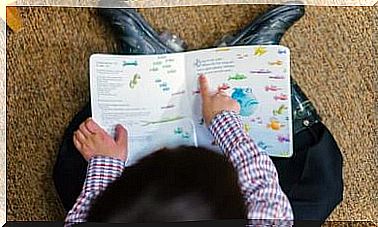What Happens When Your Loved Ones Don’t Share Your Way Of Educating?

You have spent nine months and a whole life thinking about how you are going to educate your children. Fortunately, today you have millions of resources, books, conferences, methods and experiences that help you make a sketch of what that education will be like. Thanks to all this you have come to the idea of a project and you plan to carry it out against all odds. But what if that wind and tide are your closest and dearest ones?
As a general rule, we like that the people we love accept us and give us their sincere and unconditional approval, that they tell us that our criteria are valid and that we are in a position to make good decisions. In addition, if we talk about an educational project for our children, this feeling of approval can be even more rewarding (or painful in case of failure).
Here are some recommendations for you to manage this external influence that hangs over you in an intelligent way.
Do not be scared that others think
Become a transmitter and defender of your ideas, base them and apply them in those contexts in which you understand that they are coherent and correct. Have respectful discussions or talks with others, but try not to impose or become more intense than usual. It is normal that some people think differently and want to give you their opinion. Most of the time they do it out of respect and with the intention of helping.

If you learn to listen to the opinions of others with respect, it is more likely that others will respect yours. This will make it easier for them to be open and receptive, understanding that your position can provide them with interesting information.
It is good for children to see other types of education
There are different types of people and it is good that our children relate to them. As they grow older it can be very positive for them to learn to look at the prism of reality from different points of view. Also, let’s think that no matter how hard we try we cannot control all the influences they receive; However, what we can do is help them to be critical of them, so that they are the ones who pass certain filters, such as those of credibility or goodness, where we do not arrive.
During the educational project that we undertake with them, I refer to childhood above all, we will be their greatest influence. Think that they are the ones who are going to look at you every time something new appears in their lives, looking for a reference in your reaction to qualify it as good or bad.
Set limits: flexible and non-flexible
It is good to listen to other opinions, to have other influences, something that does not mean that there must be certain red lines that lack flexibility. You are the guide and the one with the most information. Do not get into arguments or confrontations. Accept what they give you up to a reasonable limit. If the discussion is not going to go anywhere and even this lack of agreement can affect the forms, it will be better to leave it there.
Normally, families and friends tend to respect the choices we have made. However, if we see that they go overboard in their appreciations, we will have to close the discussion and remind them of their role. End those moments by saying, “I decide to do it like this.”
Set minimum rules with those closest to you
When the people in your environment have a great influence with your children, such as grandparents, uncles, etc., it is best that you give them some guidelines of what they can or cannot do with them. Only basic questions and that are very important to you. This point is very important because many of the gaffes of the relatives do not originate in a different educational criterion, but in a lack of guidance that tells them how they have to act in certain situations.

You can speak the rest of the guidelines and even open yourself to a negotiation, as long as each one is clear about their role. Thus, it is very positive that the child perceives a consistency in the most important norms, but we cannot expect him to maintain the same discipline on a daily day at home as on a holiday with his grandparents. It can be just as damaging to let someone slip out of their role as not letting them take over.
Don’t feel like a freak
Manuals for parenting that can be applied in all cases and conditions do not exist. Think that when we choose a way of educating our children, we usually also choose a line with a general direction and meaning, but for the edges of that line we take ideas from here and there. Currently there are books and other materials that can help us with ideas and advice.
There are also many parent groups, talks, workshops and many other resources that can help us see that there are other parents who think like us and share what we are doing. They are not, so to speak, aid groups, but they end up functioning as such.
This helps us understand that we are not alone. That there are many people, especially parents like us, who also fight, work and think about the best way to raise their children. Parents who also make mistakes and learn. Perceiving it will help us to confront people in our environment who do not understand or support us with the line we have chosen.

My intention and the most important intention of this article is to convey to you that raising and educating can be very beautiful. It is a way, your way of educating, of putting your grain of sand in this world and you try to do it taking into account what you think is best for your children. In addition, I understand that in part you perceive them as defenseless beings who at any moment can be placed under the focus of bad influences. In this sense, I encourage you to inform yourself, to make decisions and to take the opinion of others as what they are, opinions.
I encourage you to correct them if they do it wrong, but to do it with common sense. Differentiate those flexible limits from those that are not and allow others to play their role – that of brothers, grandparents, uncles, friends, etc. – without interfering with yours. Finally enjoy, enjoy seeing him smile, the pleasure with which he has a sweet from time to time or falling asleep with his grandfather on the sofa.









